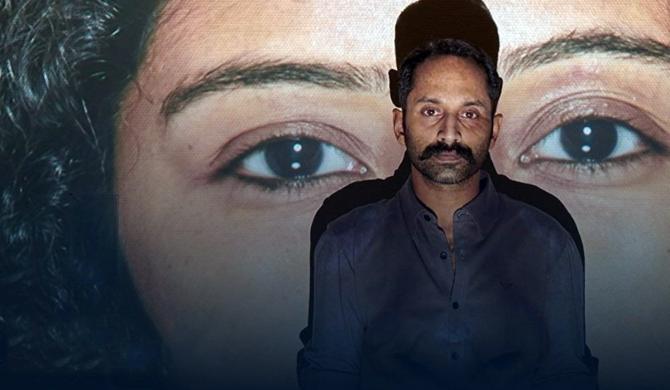What Director Mahesh Narayanan captures perfectly in C U Soon is the texture of our online conversations, observes Sreehari Nair.

I emerged from Mahesh Narayanan's C U Soon, plagued by one question: 'Did Fahadh Faasil do his own typing?'
Narayanan's film is structured almost entirely out of video and text conversations between its characters and, more often than not, you understand what these characters are thinking by how they play around with their messages: Their tentative three full-stops after a word, their conscious capitalization of letters, their backspacing of sentences thoughtlessly composed.
And in a film mounted this way, getting Fahadh to type his messages himself, becomes as important as getting the actor to speak his lines himself.
Mahesh Narayanan will be praised for the film's gee whiz editing, while, in truth, he deserves praise for all that he has decided to not edit out.
Narayanan gives us not just texts-on-screens that live and breathe and detonate (spelling suggestions and corrections are shown to be an integral part of the online Kamikaze war); he also retains the little pauses that occur during video calls, the wetting of lips, those moments of self-admiration before the mobile camera, and the slightly over-intense listener's expression.
The concept of 'videophonic stress', about which David Foster Wallace had warned us, has been presented here for us to sample; and presented also, is the phenomenon of thoughts being modified at the speed of key-press.
Mahesh Narayanan may have set his sights on drawing us into this story by way of a fancy framework -- but we end up locating the characters’ emotions inside this framework.
Outside of the intimate virtual framework, however, C U Soon enters a state of fugue.
I didn't much care for the gizmo-heavy investigation which forms the movie's centerpiece: It is just too convenient (and too bad if you get drunk on the editing, and fail to see how conveniently the plot strands are interwoven).
Narayanan tries to offset the quick and morally neat plot resolutions by having the flavour of the season drive the investigation.
Fahadh, here, plays Kevin, a Red Bull gulping, cigarette chomping, sleep-deprived professional hacker who is forced to probe a botched love affair between his cousin Jimmy and a girl Jimmy meets on the Internet. Kevin is the hacker, who, in the course of the film, transforms into its Digital Sootradhar.
It's a star turn (though, of the subdued variety) and Fahadh has been cast for the ready effect he has on the audience. His Kevin can look down on everyone else, be bored, do things at his own pace, and yet make miraculous discoveries -- all this, because he is played by an actor who has been universally acknowledged as a genius.
Like I said, I didn't care for the plot, or the genius-level deductions, but what Narayanan gets right are those little things that seem to be happening in real time.
The chats, as I have alluded to, are beautifully detailed (how can one go about subtitling those 'Manglish' text messages, which derive their marrow from that part of the Malayali character that comes alive every time an opportunity for verbal double-crossing presents itself?).
You get caught up in the chats, because they are not plot-advancing lines, but character-expanding ones; because you can sense real people lurking behind those fonts.
And, for those moments when the movie jolts out of chat screens into video screens, Mahesh Narayanan gives us faces that have been cunningly chosen, and then carefully used.
When Maala Parvathi (playing Jimmy's mother) is suddenly pulled into a video chat, she has the half-rehearsed, half-surprised, look of someone who wasn't born into this world of virtual intimacy, who has over the time gotten used to it, but who still keeps getting the shocks.
Jimmy is played by Roshan Mathew, and Narayanan seems to be banking on the actor's image as the current face of Sincere Love.
Darshana Rajendran -- who plays Anumol, Jimmy's love interest, and the source of his Internet woes -- is framed like a little bird given to frequently burying her head in nests woven out of her bedroom materials.
This is why, perhaps, when you see Anumol later, all bloodied and helpless, she seems almost de-feathered: she ignites your rescuer's spirit, as she does Jimmy's.
Saiju Kurup, whose lapses in timing are a part of his charm as an actor (he is always in and out of scenes), looks and sounds even more out-of-touch in this digitised environment -- and that gives his character, an added layer of comic frustration.
I believe there is something inherently fraudulent about films which have technology at its centre, but which finally wind up proselytising for ideas as grand as the evils of technology.
C U Soon's greatest achievement may be that to a large extent it avoids this sentimental trap.
Despite the techno-wizardry that drives its narrative (most of which, you would realise, is quite bogus) it at once manages to be a picture that the Luddites can enjoy and one that doesn't congratulate the technologically-challenged for making the right lifestyle choice.
In its finest moments, the style of the film throws light on a series of paradoxes that our ever-increasing dependence on technology creates.
When Anumol plays the guitar, you first see her posing for the Webcam, and then, as she picks up rhythm, the poseur disappears and her childhood face peeks out. The strumming starts off as a performance but gains fresh dimensions as it goes on.
The video chat screens are arranged in a manner that suggests not just the time-sharing aspect suggested by split-screens, but also how boundaries get blurred in this invasive environment.
And inhabiting this environment, with a heightened awareness of all the paradoxes it throws up, is Kevin, who appears to be living with the burden of doing an unethical job, justified forever by a set of ethical prescriptions.
To play Kevin, the hacker-in-demand, Fahadh seems to be drawing upon his own emotional experience as an artist who has suddenly found himself shrouded in the kind of media attention he has been striving to evade (incidentally, in this film, the actor gets to utter his first full-blown swear word, when, in frustration, he bellows, 'Mayire!').
Kevin's notable physical activity, here, is getting up from his chair and walking away from his computer screen; and when he slips into this routine, he seems to be turning his back on all that electronic paraphernalia he had once lived for.
Kevin is not anymore the adolescent who got into this gig for the love of high circuitry; he is a grown up slowly coming to terms with the limits of technology. And by the end of his investigation, this proud, afraid-of-commitment whiz-kid, finds in Anumol and Jimmy's love story a counterpoint to his own excesses: He starts to see the perils of viewing bodies as being just as interchangeable as devices.
Strangely enough, Kevin's story-arc ties in with Mahesh Naryanan's arc as a film-maker.
In his first outing, Take-Off, despite his best efforts, the thrills had taken over, drowning out almost everything else, and all we were left with was a rousing background score -- that film was a genre piece, in the strictest sense.
In C U Soon, Naryanan, a man clearly with a lot of fondness for gadgetry, in surrounding himself with his favourite things, seems to have developed for them a wistful eye.
'The Medium is the Message,' Marshall McLuhan had proclaimed, some 50 years ago.
Mahesh Narayanan, by turning his passion into his subject matter, by turning machines into curtains behind which we hide and through which we reveal ourselves in surprising ways, has achieved the human scale.












